allergy support
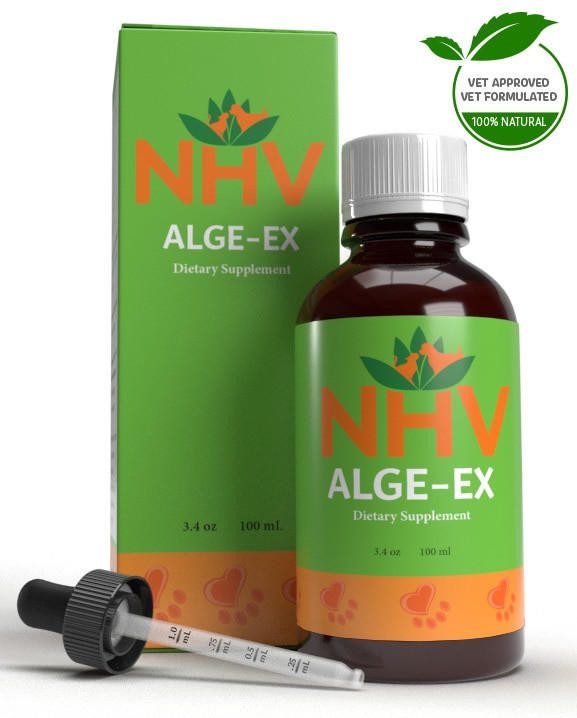
free shipping over $100 (USA & Canada)
1-877-937-4372 the pet expert hotline
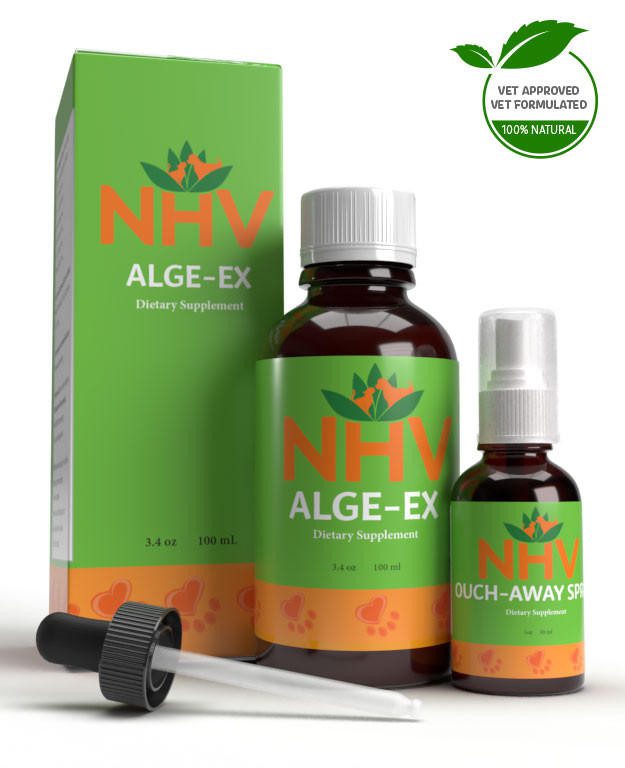
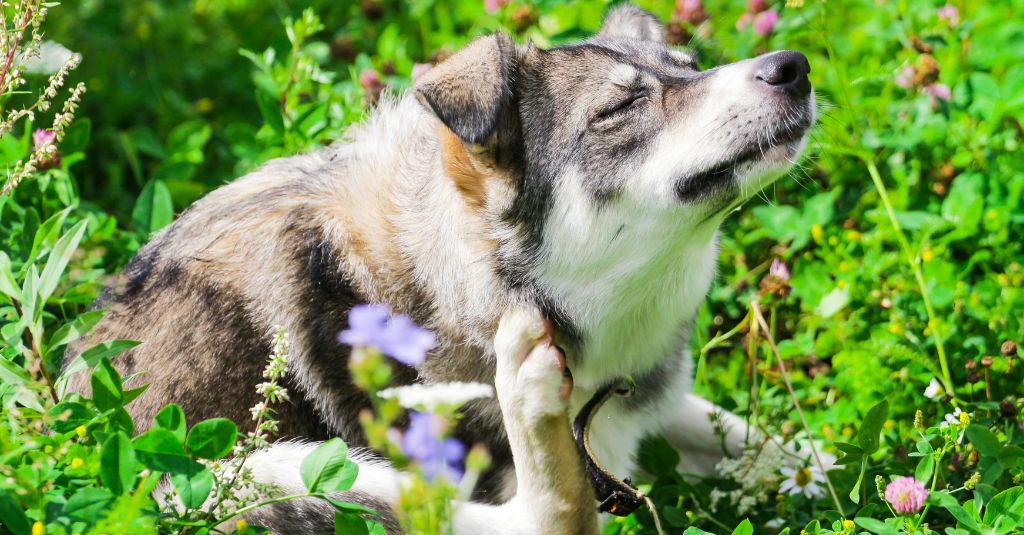
Any weather change represents a new challenge for dogs with seasonal allergies. Spring and summer are the time of flowers and warmer weather, and fall is when the grass is being pollinated. Thus, with the changes in temperature, pollen, grass, and dust in the air, the chances of dogs having skin problems increase at certain times of the year.
Allergens can be found anywhere, from ingredients in your little one’s food to anything they are exposed to in their environment.
Like people, dogs might have allergic reactions to a series of things. The element that triggers the symptoms, like itching, inflammation, and reddening of the skin, is called an allergen. They can be found anywhere, from ingredients in your little one’s food to anything they are exposed to in their environment, causing overstimulation of the immune system and the typical signs of allergies.
The skin discomfort caused by an allergic reaction can happen either localized, in the affected area, or all over the body. But seasonal allergies can also lead to other symptoms, such as watery eyes, sneezing, and coughing. In more severe cases, an allergic dog can present generalized swelling and respiratory issues.
Interestingly enough, recent studies show that these upper respiratory symptoms can occur in response to your pet’s skin contact with an allergen. Contrary to past beliefs that sneezing and coughing could only be caused by inhaling the allergen agent.
Seasonal or environmental allergies are among the most common health issues in dogs. However, symptoms like itchiness can be a sign of several other health concerns, including food allergy or a different skin condition. We recommend taking your dog for a veterinarian consultation at the first sign of these signs for a proper examination and diagnosis.
These are the two types of testing for environmental allergies that can help confirm the diagnosis:

Treating dogs with seasonal allergies may be difficult, as the only solution is to reduce contact with the allergens, which is not always possible. However, you can help your little one feel better in many ways. Patience and perseverance are key, as treatments can take a while to show improvements.
Depending on the severity of the condition, the vet will prescribe medication that can help manage the symptoms alongside natural supplements. Pharmaceuticals and herbal formulas can also help balance the immune system, increase the quality of the skin barrier, and prevent or treat secondary infections.
If you are looking for natural support, NHV Alge-Ex was explicitly vet-formulated to help dogs with seasonal allergies. This herbal blend can help address symptoms such as sneezing, itching, scratching, and eye and ear rubbing. Alge-Ex may also decrease inflammation of the upper respiratory tract.
Some studies have indicated that using omega 3’s may help with symptoms of inflammation and discomfort. That is why NHV PetOmega 3 is another great aid in supporting your dog’s skin barrier and coat health.
Lastly, NHV Ouch Away is a glycerin-based spray that may help calm irritated skin. This topical blend will support your pup in fighting infections in case of a skin injury or wound. As an added benefit, Ouch Away spray may help with hair regrowth.
If you notice your little one is itching or sneezing more than usual in a specific period of the year, you might be dealing with environmental allergies. Please reach out to us for a personalized recommendation for dogs with seasonal allergies, especially if your little one is also dealing with other health concerns. Click below, and someone from our team of pet experts will help you!
allergy support

Natural Remedy for Environmental Allergies in Dogs
buy 2 and save $3
3 month supply for a small to medium size pet.
What is it?
NHV Alge-Ex for Dogs can help support your furkid with environmental allergies and help ease symptoms. The 100% herbal formula can also serve as proactive support for potential allergic reactions.
How Does it Work?
Why Should I Trust It?
Safe, natural herbal supplement formulated by veterinarians.

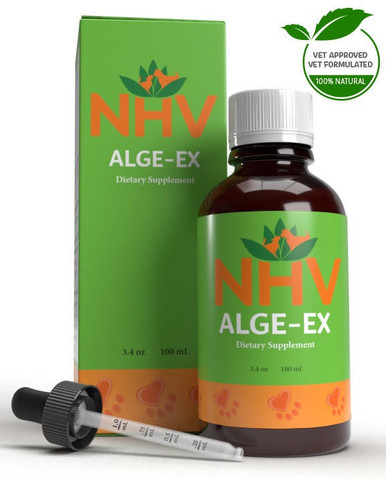
What is it?
NHV Alge-Ex for Dogs can help support your furkid with environmental allergies and help ease symptoms. The 100% herbal formula can also serve as proactive support for potential allergic reactions.
How Does it Work?
Why Should I Trust It?
Safe, natural herbal supplement formulated by veterinarians.

Achoo - oh no, is your sweet pup suffering from environmental allergies?
Seeing our precious pups struggle with allergies in dogs is rough. However, environmental allergens are unavoidable. From dust at home to different pollens and pests in nature, it is very easy for our outdoorsy pups to get in contact with these potential triggers.
You may ask, “Is there a natural way to help support them?”
The answer is yes!
Holistic supplements like our Alge-Ex for dogs can help support environmental allergies in dogs. The herbal blend helps manage your pup’s immune response to keep those allergic reactions at bay, helps reduce symptoms during an acute allergy attack, and helps with environmental allergy symptoms. 100% natural and free of additives and preservatives, this vet formulation contains a blend of herbs like Eyebright (an anti-inflammatory herb used to help itchy eyes and eye infections), Echinacea Angustifolia (to help with immune support), Ginger (a natural antioxidant that can support the respiratory system), and more.
We all know that preventing our furkids from inhaling or being in contact with environmental allergens is almost impossible. Fortunately, you can help support your pup’s immune reaction to these airborne irritants by using safe and natural herbal supplements like our Alge-Ex for dogs.
Alge-Ex for dogs helps prevent allergies by supporting histamine and immune response activity. Herbs like Feverfew help manage the formation of histamine. The unique blend of herbs also helps alleviate the symptoms of environmental allergies and hay fever. For example, Eyebright helps ease itchy eyes and helps with swollen eyelids and blood vessels. Echinacea, at the same time, has been used to help with sinusitis, hay fever, asthma, and ear infections.
All our products are made in Canada and have helped thousands of pets around the world! Just read some of our real stories from pets. They are human-grade and manufactured in a GMP-certified and FDA-approved facility. We can take the safety and health of your pet seriously!
Allergies in dogs happen when their immune system overreacts to a foreign substance (allergen). In environmental allergies, these allergens can be dust, pollens, grasses, weeds, molds, and many more. When your pup’s body senses the allergen, it will set off a range of allergic reactions to defend their body against them. These reactions lead to different symptoms.
If you notice these symptoms, please visit a vet for a full examination.
All our products are 100% natural herbal supplements formulated by a holistic veterinarian and master herbalist with over 50+ years of experience.
We have a team of supportive Pet Experts to help you and your furkiddos with any questions and concerns! So, please don’t hesitate to reach out if you need anything! We are always here to help.
Help protect your dog from allergies by ordering our Alge-Ex for dogs!
If you want to learn more about environmental and seasonal allergies in dogs, feel free to check out our blogs about canine allergies and how to alleviate dog allergies.
A healthy, balanced diet is also vital to their recovery and may help relieve the inflammation and irritation they experience. Our in-house veterinarian, Dr. Amanda, can help design a personalized diet plan for your sweetheart. Please reach out if you need her help!
All NHV supplements are made with the finest quality organic or ethically harvested herbs. We use non-GMO vegetable glycerin as our base. NHV products are full-spectrum extracts.
Select your pet's weight to determine the correct dose.
To be taken twice daily. Determine your pet’s weight and then use the easy chart below to determine the correct dose. This is the minimum dosage.
Pet's Weight Dosage
0 - 15 lb = 0.5 ml
16 - 30 lb = 1.0 ml
31 - 45 lb = 1.5 ml
46 - 60 lb = 2.0 ml
61 - 75 lb = 2.5 ml
Over 75 lb = 3.0 ml
How to Administer: Shake well before use. The easiest method is to use the dropper provided and place the drops into your pet’s food or favorite treat. You can also use the dropper and squirt directly into the pet’s mouth. Some pets can be finicky, if this occurs consider hiding the drops in foods most pet’s love such as fish, chicken, yogurt, or a favorite treat. If your pet only eats dry food then soak a few kibbles at feeding time.
For Best Results
Herbal dietary supplements are beneficial to the health and well-being of your pet and are safe for long-term use. Every pet responds to natural herbal supplements differently, therefore it is important to be consistent and administer the product daily. Supplements generally take two to four weeks to take effect, however this will vary from one animal to the next.
Product Storage
All NHV Natural Pet Products are pure herbal extracts and contain no artificial additives, preservatives, or coloring. Shelf life after opening is 6 months and must be refrigerated after opening.
Cautions and Contraindications
Do not use Alge-Ex in pregnant or nursing animals.
Speak to your vet before using our products. A second visit is recommended if your pet’s condition does not improve, or deteriorates after continued use of the supplements.
All information provided by NHV Natural Pet Products is for educational purposes only.
Achoo - oh no, is your sweet pup suffering from environmental allergies?
Seeing our precious pups struggle with allergies in dogs is rough. However, environmental allergens are unavoidable. From dust at home to different pollens and pests in nature, it is very easy for our outdoorsy pups to get in contact with these potential triggers.
You may ask, “Is there a natural way to help support them?”
The answer is yes!
Holistic supplements like our Alge-Ex for dogs can help support environmental allergies in dogs. The herbal blend helps manage your pup’s immune response to keep those allergic reactions at bay, helps reduce symptoms during an acute allergy attack, and helps with environmental allergy symptoms. 100% natural and free of additives and preservatives, this vet formulation contains a blend of herbs like Eyebright (an anti-inflammatory herb used to help itchy eyes and eye infections), Echinacea Angustifolia (to help with immune support), Ginger (a natural antioxidant that can support the respiratory system), and more.
We all know that preventing our furkids from inhaling or being in contact with environmental allergens is almost impossible. Fortunately, you can help support your pup’s immune reaction to these airborne irritants by using safe and natural herbal supplements like our Alge-Ex for dogs.
Alge-Ex for dogs helps prevent allergies by supporting histamine and immune response activity. Herbs like Feverfew help manage the formation of histamine. The unique blend of herbs also helps alleviate the symptoms of environmental allergies and hay fever. For example, Eyebright helps ease itchy eyes and helps with swollen eyelids and blood vessels. Echinacea, at the same time, has been used to help with sinusitis, hay fever, asthma, and ear infections.
All our products are made in Canada and have helped thousands of pets around the world! Just read some of our real stories from pets. They are human-grade and manufactured in a GMP-certified and FDA-approved facility. We can take the safety and health of your pet seriously!
Allergies in dogs happen when their immune system overreacts to a foreign substance (allergen). In environmental allergies, these allergens can be dust, pollens, grasses, weeds, molds, and many more. When your pup’s body senses the allergen, it will set off a range of allergic reactions to defend their body against them. These reactions lead to different symptoms.
If you notice these symptoms, please visit a vet for a full examination.
All our products are 100% natural herbal supplements formulated by a holistic veterinarian and master herbalist with over 50+ years of experience.
We have a team of supportive Pet Experts to help you and your furkiddos with any questions and concerns! So, please don’t hesitate to reach out if you need anything! We are always here to help.
Help protect your dog from allergies by ordering our Alge-Ex for dogs!
If you want to learn more about environmental and seasonal allergies in dogs, feel free to check out our blogs about canine allergies and how to alleviate dog allergies.
A healthy, balanced diet is also vital to their recovery and may help relieve the inflammation and irritation they experience. Our in-house veterinarian, Dr. Amanda, can help design a personalized diet plan for your sweetheart. Please reach out if you need her help!
All NHV supplements are made with the finest quality organic or ethically harvested herbs. We use non-GMO vegetable glycerin as our base. NHV products are full-spectrum extracts.
Select your pet's weight to determine the correct dose.
To be taken twice daily. Determine your pet’s weight and then use the easy chart below to determine the correct dose. This is the minimum dosage.
Pet's Weight Dosage
0 - 15 lb = 0.5 ml
16 - 30 lb = 1.0 ml
31 - 45 lb = 1.5 ml
46 - 60 lb = 2.0 ml
61 - 75 lb = 2.5 ml
Over 75 lb = 3.0 ml
How to Administer: Shake well before use. The easiest method is to use the dropper provided and place the drops into your pet’s food or favorite treat. You can also use the dropper and squirt directly into the pet’s mouth. Some pets can be finicky, if this occurs consider hiding the drops in foods most pet’s love such as fish, chicken, yogurt, or a favorite treat. If your pet only eats dry food then soak a few kibbles at feeding time.
For Best Results
Herbal dietary supplements are beneficial to the health and well-being of your pet and are safe for long-term use. Every pet responds to natural herbal supplements differently, therefore it is important to be consistent and administer the product daily. Supplements generally take two to four weeks to take effect, however this will vary from one animal to the next.
Product Storage
All NHV Natural Pet Products are pure herbal extracts and contain no artificial additives, preservatives, or coloring. Shelf life after opening is 6 months and must be refrigerated after opening.
Cautions and Contraindications
Do not use Alge-Ex in pregnant or nursing animals.
Speak to your vet before using our products. A second visit is recommended if your pet’s condition does not improve, or deteriorates after continued use of the supplements.
All information provided by NHV Natural Pet Products is for educational purposes only.
general wellbeing
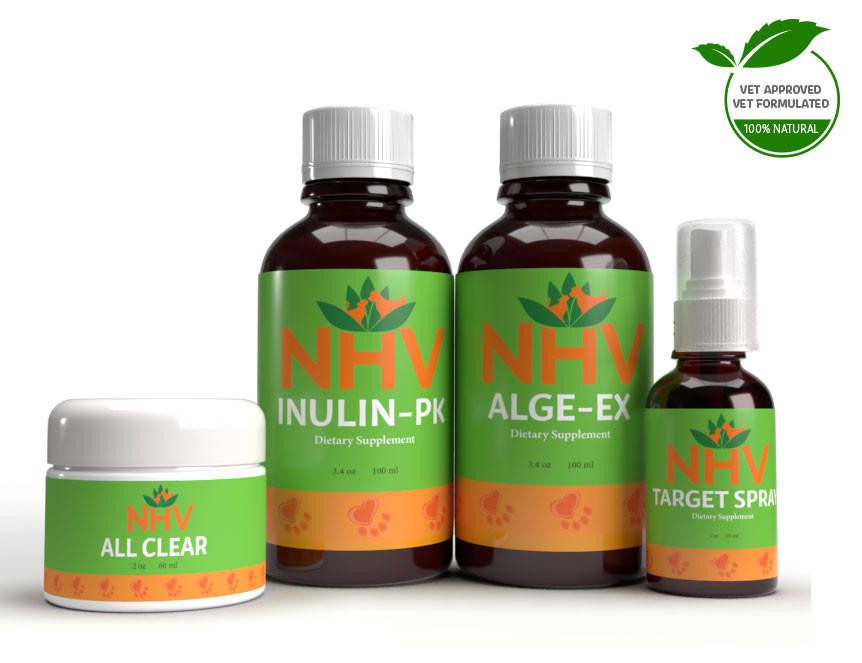
Natural Support for Parasites, Skin Allergies and Bug Bites
bundle and save with pet expert kits
3 month supply for a small to medium size pet.
What is it?
NHV’s Fun in the Sun Summer Kit is a natural supplement bundle for cats and dogs that supports their health and energy during outdoor activities like hiking, camping, and traveling.
How Does it Work?
Why Should I Trust It?
Made specifically for pets, vet-formulated and vet approved.

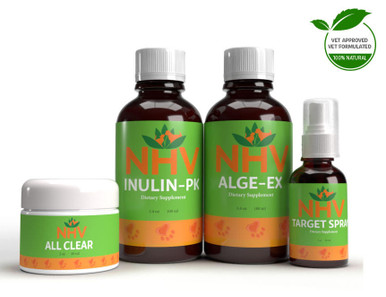
What is it?
NHV’s Fun in the Sun Summer Kit is a natural supplement bundle for cats and dogs that supports their health and energy during outdoor activities like hiking, camping, and traveling.
How Does it Work?
Why Should I Trust It?
Made specifically for pets, vet-formulated and vet approved.

Is your dog or cat getting excited about the longer days and all of the new sights and smells? Summer is the perfect time to take your little one hiking, camping, or travelling with you. Support them with cat and dog supplements so they can enjoy summer to the fullest without worry with NHV’s Fun in the Sun Summer Kit.
Natural Supplements for Dogs and Cats Ready For A Day Out
Before venturing into the wilderness or travelling with your furkiddo, you can help prevent the discomfort your little one could face when exposed to the elements. They could come into contact with other animals or insects while camping, hiking, or in an airplane. We advise checking with your vet so that all of your pet’s vaccinations are up to date. NHV Fun in the Sun Summer Kit contains Inulin-PK, Alge-Ex, All Clear Ointment, and Target Spray to naturally support the elimination of parasites, help support your pet’s immune system, soothe discomfort/inflammation, and help deter bug bites.
How NHV Remedies Support Your Pet’s Adventurous Side
Watching your furbaby sneezing and scratching or having an upset tummy is the opposite of fun in the sun! When your furkiddo is on an adventure, they don’t want to have to worry about getting sick, so as their pet pawrent, you can support them with the NHV Fun in the Sun Summer Kit which contains Inulin-PK - a natural dewormer that may helps with internal parasite prevention, Alge-Ex - an immune system support to manage histamine response and allergy symptoms, All Clear Ointment - a topical ointment for inflamed, itchy skin, and Target Spray - an all-natural insect spray that shields against ticks, fleas, and mosquitos. For best results, we recommend giving your furbaby Inulin-PK and Alge-Ex for at least 3 weeks before your trip; afterward, they are both great supplements for your dog or cat’s long-term proactive care plan. All Clear Ointment and Target Spray are great to have on hand to support your pet against biting critters and inflamed paws (from long hikes).
Fun in the Sun Summer Kit is a cat and dog supplement kit that aids with allergy symptoms, helps support gentle elimination of parasites as well as helps shield your pets from ticks, fleas, and mosquitos. These liquid supplements, with high bioavailability, are safe and effective to use alongside other vet-prescribed treatments ie. tick or flea prevention.
Extra Support for Pets
Are you taking your furkiddo on a big hike or camping trip and feeling overwhelmed with packing? Read to help you prepare!
If you’re a pet parent with a senior dog or cat, you know that in the summer, they get just as excited as their younger counterparts. Read our summer checklist for senior pets for tips on how to keep your furkiddo happy and healthy on those hot summer days!
At NHV, we are a team of pet experts, holistic veterinarians, and animal enthusiasts. Get in touch with us if you have any questions or concerns about how to best support your pet on their outdoor adventures.
Made with the finest, organically grown, or ethically harvested herbs. Made specifically for pets, vet-formulated and vet approved.
Inulin-PK
Alge-Ex
All Clear Ointment
Target Spray
INULIN-PK and ALGE-EX : To be taken twice daily. Determine your pet’s weight and then use the easy chart below to determine the correct dose. This is the minimum dosage.
Pet's Weight Dosage
0 - 15 lb = 0.5 ml
16 - 30 lb = 1.0 ml
31 - 45 lb = 1.5 ml
46 - 60 lb = 2.0 ml
61 - 75 lb = 2.5 ml
Over 75 lb = 3.0 ml
For small animals (rabbits, ferrets), avians and reptiles use 1 drop for every 2 lb of body weight.
How to Administer
Shake well before use. The easiest method is to use the dropper provided and place the drops into your pet’s food or favorite treat. You can also use the dropper and squirt directly into the pet’s mouth. Some pets can be finicky, if this occurs consider hiding the drops in foods most pet’s love such as fish, chicken or yogurt or a favorite treat. If your pet only eats dry food then soak a few kibbles at feeding time.
For Best Results
Herbal dietary supplements are beneficial to the health and well-being of your pet and are safe for long-term use. Every pet responds to natural herbal supplements differently, therefore it is important to be consistent and administer the product daily. Supplements generally take two to four weeks to take effect, however this will vary from one animal to the next.
Product Storage
All NHV Natural Pet Products are pure herbal extracts and contain no artificial additives, preservatives or coloring. Shelf life after opening is 6 months and must be refrigerated after opening.
Cautions and Contraindications
Do not use in pregnant or nursing animals.
How to Administer
Topical ointment: Clean and dry affected area(s). Apply to the affected area 3 to 4 times per day. It may sometimes be necessary to shave or trim your pet’s hair so that the All Clear Ointment may penetrate better.
Caution
Do not apply on open or bleeding wounds.
How to Administer
Topical Spray: Lightly spray your pet from back of ears to tail, taking care to avoid the eye area. Brush through coat, repeat as needed.
Caution
Do not spray near or into the eyes or nose. Do not use on pregnant animals.
All information provided by NHV Natural Pet Products is for educational purposes only.
Is your dog or cat getting excited about the longer days and all of the new sights and smells? Summer is the perfect time to take your little one hiking, camping, or travelling with you. Support them with cat and dog supplements so they can enjoy summer to the fullest without worry with NHV’s Fun in the Sun Summer Kit.
Natural Supplements for Dogs and Cats Ready For A Day Out
Before venturing into the wilderness or travelling with your furkiddo, you can help prevent the discomfort your little one could face when exposed to the elements. They could come into contact with other animals or insects while camping, hiking, or in an airplane. We advise checking with your vet so that all of your pet’s vaccinations are up to date. NHV Fun in the Sun Summer Kit contains Inulin-PK, Alge-Ex, All Clear Ointment, and Target Spray to naturally support the elimination of parasites, help support your pet’s immune system, soothe discomfort/inflammation, and help deter bug bites.
How NHV Remedies Support Your Pet’s Adventurous Side
Watching your furbaby sneezing and scratching or having an upset tummy is the opposite of fun in the sun! When your furkiddo is on an adventure, they don’t want to have to worry about getting sick, so as their pet pawrent, you can support them with the NHV Fun in the Sun Summer Kit which contains Inulin-PK - a natural dewormer that may helps with internal parasite prevention, Alge-Ex - an immune system support to manage histamine response and allergy symptoms, All Clear Ointment - a topical ointment for inflamed, itchy skin, and Target Spray - an all-natural insect spray that shields against ticks, fleas, and mosquitos. For best results, we recommend giving your furbaby Inulin-PK and Alge-Ex for at least 3 weeks before your trip; afterward, they are both great supplements for your dog or cat’s long-term proactive care plan. All Clear Ointment and Target Spray are great to have on hand to support your pet against biting critters and inflamed paws (from long hikes).
Fun in the Sun Summer Kit is a cat and dog supplement kit that aids with allergy symptoms, helps support gentle elimination of parasites as well as helps shield your pets from ticks, fleas, and mosquitos. These liquid supplements, with high bioavailability, are safe and effective to use alongside other vet-prescribed treatments ie. tick or flea prevention.
Extra Support for Pets
Are you taking your furkiddo on a big hike or camping trip and feeling overwhelmed with packing? Read to help you prepare!
If you’re a pet parent with a senior dog or cat, you know that in the summer, they get just as excited as their younger counterparts. Read our summer checklist for senior pets for tips on how to keep your furkiddo happy and healthy on those hot summer days!
At NHV, we are a team of pet experts, holistic veterinarians, and animal enthusiasts. Get in touch with us if you have any questions or concerns about how to best support your pet on their outdoor adventures.
Made with the finest, organically grown, or ethically harvested herbs. Made specifically for pets, vet-formulated and vet approved.
Inulin-PK
Alge-Ex
All Clear Ointment
Target Spray
INULIN-PK and ALGE-EX : To be taken twice daily. Determine your pet’s weight and then use the easy chart below to determine the correct dose. This is the minimum dosage.
Pet's Weight Dosage
0 - 15 lb = 0.5 ml
16 - 30 lb = 1.0 ml
31 - 45 lb = 1.5 ml
46 - 60 lb = 2.0 ml
61 - 75 lb = 2.5 ml
Over 75 lb = 3.0 ml
For small animals (rabbits, ferrets), avians and reptiles use 1 drop for every 2 lb of body weight.
How to Administer
Shake well before use. The easiest method is to use the dropper provided and place the drops into your pet’s food or favorite treat. You can also use the dropper and squirt directly into the pet’s mouth. Some pets can be finicky, if this occurs consider hiding the drops in foods most pet’s love such as fish, chicken or yogurt or a favorite treat. If your pet only eats dry food then soak a few kibbles at feeding time.
For Best Results
Herbal dietary supplements are beneficial to the health and well-being of your pet and are safe for long-term use. Every pet responds to natural herbal supplements differently, therefore it is important to be consistent and administer the product daily. Supplements generally take two to four weeks to take effect, however this will vary from one animal to the next.
Product Storage
All NHV Natural Pet Products are pure herbal extracts and contain no artificial additives, preservatives or coloring. Shelf life after opening is 6 months and must be refrigerated after opening.
Cautions and Contraindications
Do not use in pregnant or nursing animals.
How to Administer
Topical ointment: Clean and dry affected area(s). Apply to the affected area 3 to 4 times per day. It may sometimes be necessary to shave or trim your pet’s hair so that the All Clear Ointment may penetrate better.
Caution
Do not apply on open or bleeding wounds.
How to Administer
Topical Spray: Lightly spray your pet from back of ears to tail, taking care to avoid the eye area. Brush through coat, repeat as needed.
Caution
Do not spray near or into the eyes or nose. Do not use on pregnant animals.
All information provided by NHV Natural Pet Products is for educational purposes only.
overall vitality
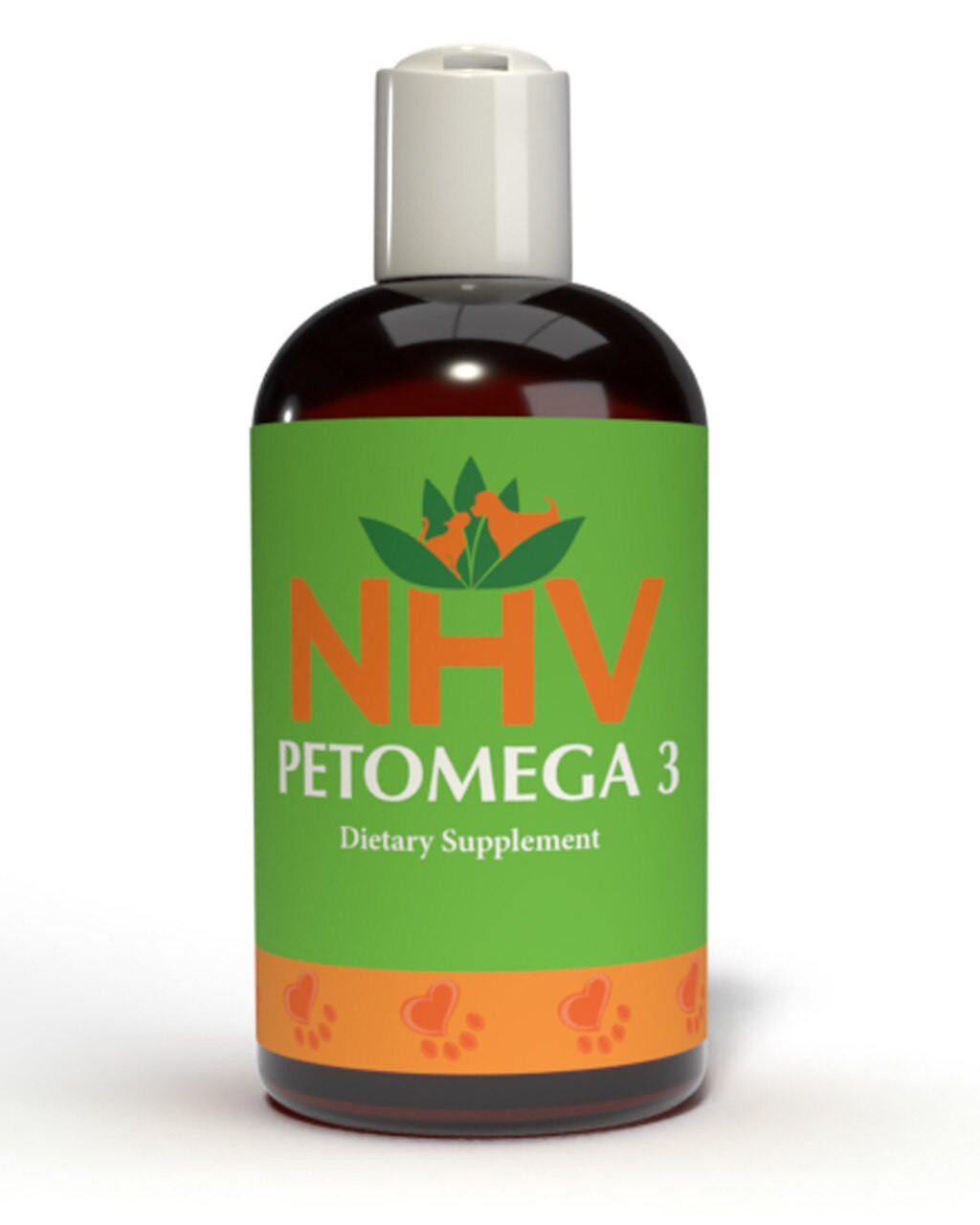
For Overall Health and Well-Being
buy 2 and save $3
What is it?
Support your dog’s health with omega-3 fish oil for dogs, promoting a healthy coat, eyes, joints, immune system, and overall organ function.
How does it work?
Why trust it?
NHV Petomega 3 has earned 5-star ratings by pet parents from around the world.


What is it?
Support your dog’s health with omega-3 fish oil for dogs, promoting a healthy coat, eyes, joints, immune system, and overall organ function.
How does it work?
Why trust it?
NHV Petomega 3 has earned 5-star ratings by pet parents from around the world.

Our omega 3 fish oil for dogs is a great source of EPA (Eicosapentaenoic Acid 600mg) and DHA (Docosahexaenoic acid 460mg) essential fatty acids. This fish oil supplement for dogs is derived from sardines, anchovies and North Atlantic cod liver oil. It is molecularly distilled and cold pressed to improve the bioavailability of the omega 3 fatty acids, and is medical and human grade quality.
Omega 3 fish oil for dogs may be beneficial for the following:
Processed pet foods have increased omega-6 fatty acids, and decreased omega-3 fatty acids. The University of Maryland Medical Center states, "It is very important to maintain a balance between omega-3 and omega-6 fatty acids in the diet. A proper balance helps maintain and even improve health." Your dog’s body cannot easily make essential fatty acids. It is vital to provide omega 3 fish oil for dogs as an added supplement to your pet’s daily diet.
The American Journal of Veterinary Medicine has published studies on the benefits of omega 3 fatty acids (fish oils) for arthritis and degenerative joint disease in dogs. The studies showed that dogs who were given omega 3 fatty acids had a significantly improved ability to get up from a resting position and marked improvement in walking ability.
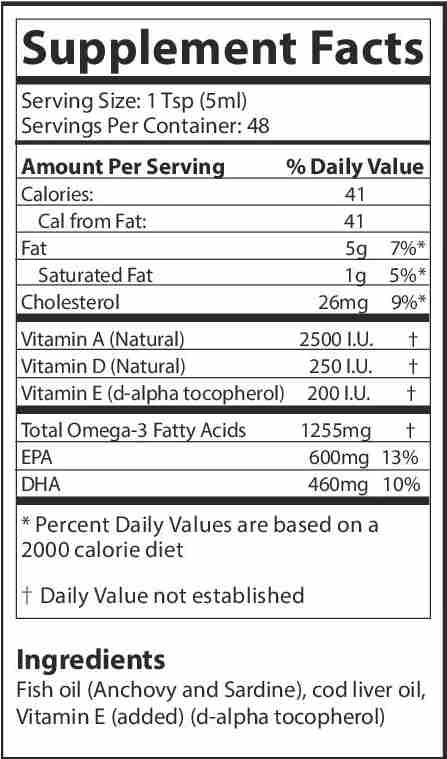
Suggested Dosage: To be taken once per day. Add to food based on weight chart.
Therapeutic Dosage: Double the quantity for maximum period of 4 weeks or follow veterinarian advise.
Pet’s Weight Dosage
0-15 lb = ¼ tsp
15-30 lb = ½ tsp
30-60 lb = 1 tsp
60-90 lb = 1 ½ tsp
How to Administer: Shake well before use. The easiest method is to add the dosage to your pets food. Some pets can be finicky, if this occurs consider hiding the appropriate amount in food most pet’s love such as fish, chicken, yogurt, or a favorite treat. If your pet only eats dry food then soak kibbles at feeding time.
For Best Results
Dietary supplements are beneficial to the health and well-being of your pet and are safe for long-term use. Every pet responds to natural supplements differently, therefore it is important to be consistent and administer the product daily. Supplements generally take two to four weeks to take effect, however this will vary from one animal to the next.
Product Storage
All NHV Natural Pet Products contain no artificial additives, preservatives or coloring. Shelf life after opening is 6 months and must be refrigerated after opening.
Cautions and Contraindications
Avoid During Pregnancy.
Our omega 3 fish oil for dogs is a great source of EPA (Eicosapentaenoic Acid 600mg) and DHA (Docosahexaenoic acid 460mg) essential fatty acids. This fish oil supplement for dogs is derived from sardines, anchovies and North Atlantic cod liver oil. It is molecularly distilled and cold pressed to improve the bioavailability of the omega 3 fatty acids, and is medical and human grade quality.
Omega 3 fish oil for dogs may be beneficial for the following:
Processed pet foods have increased omega-6 fatty acids, and decreased omega-3 fatty acids. The University of Maryland Medical Center states, "It is very important to maintain a balance between omega-3 and omega-6 fatty acids in the diet. A proper balance helps maintain and even improve health." Your dog’s body cannot easily make essential fatty acids. It is vital to provide omega 3 fish oil for dogs as an added supplement to your pet’s daily diet.
The American Journal of Veterinary Medicine has published studies on the benefits of omega 3 fatty acids (fish oils) for arthritis and degenerative joint disease in dogs. The studies showed that dogs who were given omega 3 fatty acids had a significantly improved ability to get up from a resting position and marked improvement in walking ability.

Suggested Dosage: To be taken once per day. Add to food based on weight chart.
Therapeutic Dosage: Double the quantity for maximum period of 4 weeks or follow veterinarian advise.
Pet’s Weight Dosage
0-15 lb = ¼ tsp
15-30 lb = ½ tsp
30-60 lb = 1 tsp
60-90 lb = 1 ½ tsp
How to Administer: Shake well before use. The easiest method is to add the dosage to your pets food. Some pets can be finicky, if this occurs consider hiding the appropriate amount in food most pet’s love such as fish, chicken, yogurt, or a favorite treat. If your pet only eats dry food then soak kibbles at feeding time.
For Best Results
Dietary supplements are beneficial to the health and well-being of your pet and are safe for long-term use. Every pet responds to natural supplements differently, therefore it is important to be consistent and administer the product daily. Supplements generally take two to four weeks to take effect, however this will vary from one animal to the next.
Product Storage
All NHV Natural Pet Products contain no artificial additives, preservatives or coloring. Shelf life after opening is 6 months and must be refrigerated after opening.
Cautions and Contraindications
Avoid During Pregnancy.
Published: June 26, 2023